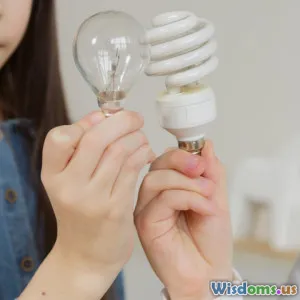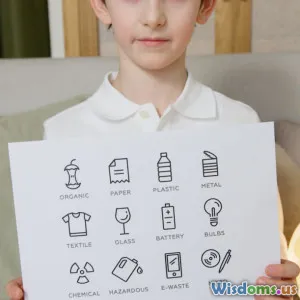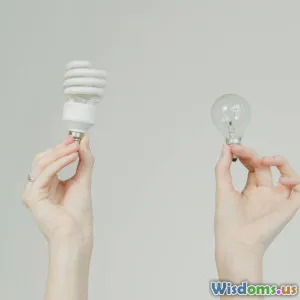
Ten Solar Myths Debunked What Homeowners Should Really Know
9 min read Discover the truth behind common solar myths, empowering homeowners with facts to make smart solar energy decisions. (0 Reviews)
Ten Solar Myths Debunked: What Homeowners Should Really Know
Solar power’s rise as a sustainable energy source has captured the imagination of homeowners worldwide. Yet despite booming adoption, a cloud of myths still darkens the truth about solar energy. Misconceptions can mislead millions, keeping some away from making smart, eco-friendly decisions—or causing hesitancy based on outdated or inaccurate information.
In this detailed exposé, we unravel ten of the most persistent solar myths. Our goal: to empower you, the homeowner, with clear facts and real-world insights so you can confidently weigh solar energy’s real potential for your home and wallet.
Myth 1: Solar Panels Don’t Work in Cloudy or Cold Climates
A common myth is that solar only shines in hot, sunny places like Arizona or California. This is partly true but often exaggerated. Solar panels actually capture daylight, not just direct sunlight, so they still generate electricity under cloudy conditions.
Example: Germany—a global solar leader—has a predominantly cloudy climate but leads in solar adoption, generating roughly 10-15% of its electricity from solar via rooftop installations. That proves solar viability far beyond sun-soaked regions.
Cold weather can improve panel efficiency since extreme heat can reduce output. Snow can temporarily block panels, but often clears off or melts quickly. Today’s solar systems also include monitoring features to optimize energy output even on gloomy days.
Myth 2: Solar Panels are Too Expensive for Average Homeowners
The upfront cost concern is a major barrier—but it’s an outdated view. Prices for solar installations have dropped around 70% over the past decade thanks to technology advances and economies of scale.
According to the National Renewable Energy Laboratory (NREL), the average cost per watt of residential solar has fallen below $3 in the U.S. Additionally, many states and the federal government offer tax credits, incentives, and rebates, slashing the net cost further.
Many homeowners see payback periods under 8 years, with systems lasting over 25 years, providing free electricity for most of that time. Plus, many financing options like solar loans or leases make solar accessible without heavy upfront investment.
Myth 3: Solar Panels Require High Maintenance
Reality: Solar panels are largely maintenance-free. With no moving parts, they rarely break or degrade in a way that impacts function significantly.
Periodic cleaning might be needed if dust or bird droppings accumulate, but most rainfall naturally cleans panels. Routine inspections by qualified technicians every few years suffice. Durable warranties of 25-30 years cover performance guarantees.
This low upkeep contrasts with traditional systems that often require fuel delivery, cleaning, and equipment servicing.
Myth 4: Solar Energy Doesn’t Really Save Money
Studies and real-life user data show solar can reduce electricity bills dramatically, often to zero or even produce surplus energy.
A 2023 analysis by the Solar Energy Industries Association (SEIA) reports that with net metering policies, excess power is sent back to the grid, potentially earning credits or cash. Over the system's lifespan, homeowners can save tens of thousands on utility bills.
However, true savings depend on local electricity rates, solar system size, and state policies. Investigating these before installing is essential.
Myth 5: Solar Panels Damage Your Roof
If installed correctly by certified professionals, solar panels can actually prolong roof life by shielding it from weather elements.
Improper installation can cause leaks or damage, but industry standards and quality installers minimize such risks. Solar mounting hardware distributes weight evenly without stressing shingles.
Inspecting your roof’s condition beforehand is advised to ensure it can support the panels, but outright damage is very rare with proper installation.
Myth 6: Solar Power Systems Don’t Work During Power Outages
Most grid-tied solar systems automatically shut down during outages for safety reasons (to protect utility workers).
However, modern solar battery storage innovations—like the Tesla Powerwall or LG Chem RESU—enable power during outages, acting as home backup systems. These off-grid or hybrid configurations have surged in popularity.
So, while simple grid-tied solar doesn’t provide outage power, integrated storage systems do, enhancing home energy resilience.
Myth 7: Solar Panels Are Ugly and Decrease Home Value
Solar technology aesthetics have evolved significantly. Modern panels sit flush against roofs in sleek arrays. Some innovations include solar shingles or building-integrated photovoltaics, blending seamlessly.
Multiple studies actually show solar installations increase home values. A 2020 Zillow report found homes with solar systems sold for an average of 4.1% more compared to similar homes without.
Solar is increasingly seen as an asset, enhancing market appeal rather than detracting from it.
Myth 8: Solar Energy Is Not Environmentally Friendly Because of Manufacturing
Energy used in manufacturing and installing solar panels is often cited to question environmental benefit.
Life cycle assessments consistently confirm solar panels offset their embedded energy within 1-3 years of operation, sometimes faster, depending on location.
Over a typical 25-year lifespan, the clean energy output far offsets upstream impacts. According to a study by the International Renewable Energy Agency (IRENA), solar reduces CO2 emissions by nearly 90-95% compared to coal.
Myth 9: Solar Panels Will Become Obsolete Quickly Due to Technological Advancements
Though solar technology continues improving, existing panels do not become instantly obsolete. Most older panels still operate at over 80% efficiency decades after installation.
Incremental gains help future buyers, but they don’t negate the value of current systems. Early adopters enjoy years of savings and reduced emissions, and panels can be recycled or upgraded later.
Myth 10: You Can Rely Solely on Solar for All Energy Needs Anytime
Solar intermittent nature means it doesn’t generate power at night or during extended cloudy weather.
Combining solar with battery backups, energy-efficient appliances, and smart home systems can address this but requires extra investment. Many homeowners maintain grid connection as backup or supplement.
Though solar can cover significant energy needs, understanding these limits helps set realistic expectations and design optimal energy systems.
Conclusion: Empowerment Through Solar Truths
The solar myths highlighted here stem from outdated assumptions, misinformation, or partial facts. Dispelling these misconceptions reveals solar’s practical promise as an accessible, economical, and environmentally sound home energy solution.
Homeowners armed with factual insights can confidently evaluate whether adding solar fits their lifestyle and finances. As solar technology and policy continue advancing, the path toward clean energy for all homes grows clearer—and more achievable.
Embrace the facts, cut through the myths, and let solar energy light your way forward!
References and further reading:
- U.S. National Renewable Energy Laboratory (NREL) reports
- Solar Energy Industries Association (SEIA) research data
- Zillow’s solar home value analysis
- International Renewable Energy Agency (IRENA) life cycle assessments
- Real-world installer testimonials and case studies from various climate zones
Rate the Post
User Reviews
Popular Posts




















